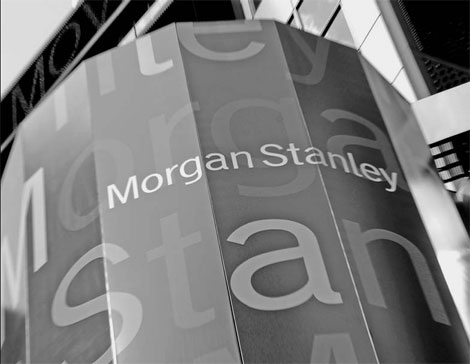US lenders face risk of contagion from Europe exposure, Fitch says
|
The Morgan Stanley sign above its headquarters in New York. According to Fitch Ratings, the six biggest US banks - JPMorgan Chase & Co, Bank of America Corp, Citigroup Inc, Wells Fargo & Co, Goldman Sachs Group Inc and Morgan Stanley - had $50 billion in risk tied to financially stressed nations in Europe. Peter Foley / Bloomberg |
NEW YORK - US banks face a "serious risk" that their creditworthiness will deteriorate if Europe's debt crisis deepens and spreads beyond the five most-troubled nations, Fitch Ratings said.
"Unless the eurozone debt crisis is resolved in a timely and orderly manner, the broad credit outlook for the US banking industry could worsen," the New York-based rating company said on Tuesday in a statement.
Even as US banks have "manageable" exposure to stressed European markets, "further contagion poses a serious risk", Fitch said, without explaining what it meant by contagion.
The "exposures" of US lenders to major European banks and the stressed nations of Greece, Ireland, Italy, Portugal and Spain, known as the GIIPS, are smaller than those to some of the continent's larger countries, Fitch said.
The six biggest US banks - JPMorgan Chase & Co, Bank of America Corp, Citigroup Inc, Wells Fargo & Co, Goldman Sachs Group Inc and Morgan Stanley - had $50 billion in risk tied to the GIIPS on Sept 30, Fitch said.
So-called cross-border outstandings to France for all except Wells Fargo were $188 billion, including $114 billion to French banks.
Europe's debt crisis has toppled four elected governments, with the last two, in Greece and Italy, falling last week.
Italian bond yields remained at about 7 percent - the threshold that led Greece, Portugal and Ireland to seek bailouts - and shares of French banks, including BNP Paribas SA and Societe Generale SA, dropped amid concern they'll need more capital.
Stocks slump
US stocks slumped after the Fitch report. The Standard & Poor's 500 Index slid 1.7 percent and the 24-company KBW Bank Index declined 1.9 percent.
Investor demand for the relative safety of Treasuries during the European debt crisis has sent the difference between US short-term yields and bank rates surging to levels not seen in more than two years.
The gap between the London interbank offered rate and the overnight index swap, or what traders expect the US Federal Reserve's benchmark to be over the term of the contract, widened to 38 basis points on Thursday. It was the highest level since June 2009.
Swap spreads
US five-year swap spreads climbed to 45 basis points, the most since August 2009. Investors use swaps to exchange fixed and floating interest rates.
The spread, the gap between the fixed component and the yield on similar-maturity Treasuries, is a measure of bank creditworthiness.
The TED spread, the difference between what lenders and the US government pay to borrow for three months, widened to 47 basis points on Wednesday, or 0.47 percentage points, the most since June 2010.
Yields have yet to reach the levels seen three years ago when credit markets froze and the US economy was in a recession. The TED spread was as wide as 4.64 percentage points in October 2008.
While US banks have hedged some of their risk with credit default swaps, those may not be effective if voluntary debt forgiveness becomes "more prevalent" and the insurance provisions of the instruments aren't triggered, Fitch said in the report.
The top five US banks had $22 billion in hedges tied to stressed markets, according to Fitch.
Partial disclosure
Disclosure practices also make it difficult to gauge US banks' risk, Fitch said. Companies including Goldman Sachs and JPMorgan don't provide a full picture of potential losses and gains in the event of a European default, giving only net numbers or excluding some derivatives altogether.
Guarantees provided by US lenders on government, bank and corporate debt in Greece, Italy, Ireland, Portugal and Spain rose by $80.7 billion to $518 billion in the first half of 2011, according to the Bank for International Settlements.
On Wednesday, Moody's Investors Service downgraded the senior debt and deposit ratings of 10 German public-sector banks, citing its assumption that "there is now a lower likelihood" that the lenders would get external support.
Bloomberg News
(China Daily 11/18/2011 page16)















